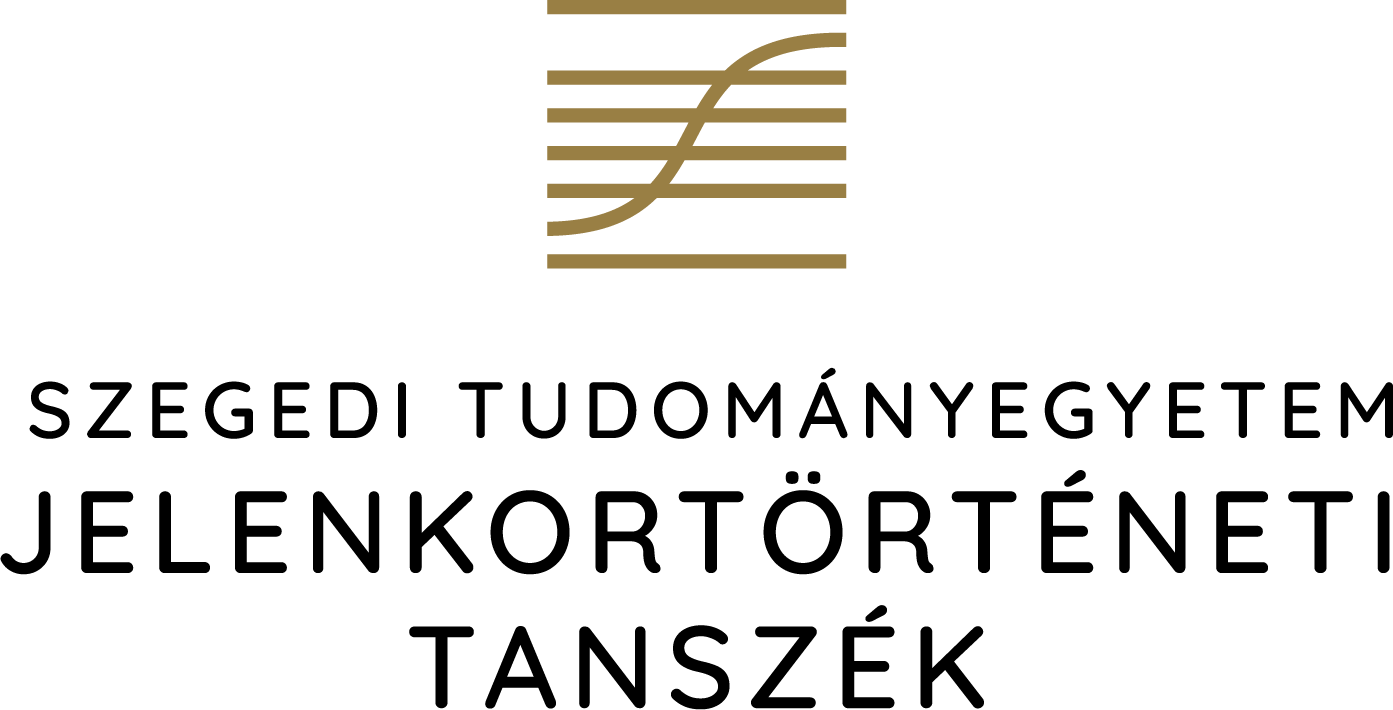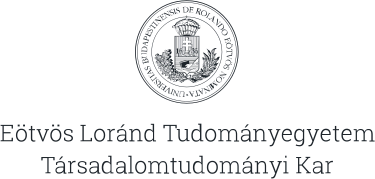

Prof. Dr. Tomka Béla
tanszékvezető egyetemi tanár
Érdeklődési terület: 20. századi magyar és európai történelem, társadalom- és gazdaságtörténet, összehasonlító történetírás (különösen a népesség és a család, a jóléti állam, a fogyasztás és a globalizáció története a 20. században).
E-mail: tomka@hist.u-szeged.hu
Telefon: (+36) 62-544-464
Iroda: Egyetem utca 2, 3223. szoba
Tomka Béla, egyetemi tanár, a Szegedi Tudományegyetem Jelenkortörténeti Tanszékének vezetője, s az ott működő Jelenkortörténeti és Összehasonlító Történettudományi Doktori Program alapítója és vezetője. Az MTA–SZTE–ELTE Globalizációtörténeti Kutatócsoport irányítója. A Hajnal István Kör – Társadalomtörténeti Egyesület elnöke. Fő kutatási területe a 20. századi társadalom- és gazdaságtörténet, különös tekintettel a nemzetközi összehasonlításokra.
Tanulmányok és tudományos fokozatok
Egyetemi tanulmányait a Szegedi Tudományegyetem (akkor: JATE) történelem szakán végezte, majd ezt követően MTA TMB ösztöndíjasként a Budapesti Corvinus Egyetem (akkor: MKKE) Gazdaságtörténeti Tanszékén folytatott doktori tanulmányokat, később az Egyesült Államokban (Minneapolis) és Németországban (Münster) tanult. 1995-ben szerezte meg a Dr. univ., 1996-ban a PhD fokozatot. 2004-ben habilitált, 2010-ben nyerte el az MTA Doktora címet.
Tudományos munkásság
A 20. századi magyar és európai gazdaság- és társadalomtörténeten belül a család és a népesség változásai, valamint a szociálpolitika alakulása álltak korábbi kutatásainak középpontjában. Legutóbbi munkái a gazdasági növekedés és a fogyasztás kelet-közép-európai összehasonlító történeti vizsgálatával foglalkoztak. Szakmai érdeklődési körébe tartozik még az erőszak, a propaganda és az ellenségképek története, valamint az európai integráció folyamata.
1992-től az Aetas c. folyóirat társszerkesztője, emellett más tudományos periodikák szerkesztőbizottságának tagja (Esély, Hungarian Historical Review, Demográfia). 2010-ben az amszterdami székhelyű International Social History Association (ISHA) elnökségébe választották, s a szervezet angol nyelvű Hírlevelének szerkesztője lett. 2016-ban a Hajnal István Kör – Társadalomtörténeti Egyesület elnöke lett, majd 2019-ben újraválasztották. Az ELTE Gazdaság- és társadalomtörténeti PhD programjának külső alapító tagja, az SZTE Történettudományi Doktori Iskolájának törzstagja, s az ott működő Jelenkortörténeti és Összehasonlító Történettudományi Doktori Program vezetője.
Európa és Amerika számos kutatóintézetében és egyetemén megfordult kutatóként és meghívott előadóként, melyek közé tartozik az International Institute of Social History (Amsterdam), Universität Mannheim, Freie Universität Berlin, Humboldt Universität zu Berlin, University of Oxford, University of Edinburgh, Portland State University (OR), Imre Kertész Kolleg (Jéna), Institut für Ost- und Südosteuropaforschung (Regensburg), Univerzita Hradec Králové. Tizenöt könyv szerzője és további kötetek szerkesztője, emellett nagyszámú tanulmányt közölt. A Bolyai Plakett (2010) és az Akadémiai Díj birtokosa (2010). A Routledge kiadónál 2013-ban megjelent könyve elnyerte az American Library Association “Outstanding Academic Title 2013” díját.
Szakmai önéletrajz
Tomka Béla
Születési hely, idő: Salgótarján, 1962. május 8.
Családi állapot: nős, két gyermek
Munkahely címe: Szegedi Tudományegyetem, BTK, Jelenkortörténeti Tanszék, 6722 Szeged, Egyetem utca 2.
Tel.: (+36) 62-544-806, fax.: (+36) 62-544-464
E-mail: tomka@hist.u-szeged.hu
Munkahelyek / Beosztások
2019–
MTA–SZTE–ELTE Globalizációtörténeti Kutatócsoport, vezető
2014–
SZTE, Jelenkortörténeti Tanszék, tanszékvezető
2011–
SZTE, Történeti Intézet, egyetemi tanár
2007–2011
SZTE, Legújabbkori Egyetemes Történeti Tanszék, tanszékvezető
1999–2010
SZTE, Történeti Intézet, egyetemi docens
1997–1999
SZTE (JATE), Történeti Intézet, egyetemi adjunktus
1989–1997
SZTE (JATE), Történeti Intézet, egyetemi tanársegéd
1988
Corvinus Egyetem (MKKE) Gazdaságtörténeti Tanszék, MTA TMB–ösztöndíjas
Tanulmányok / Tudományos fokozatok / Kutatóutak
2019
Humboldt Universität, Berlin, Visiting Fellow (3 hónap)
2015
Institute for Advanced Study, Central European University, Budapest, Senior Fellow (6 hónap)
2014
Institut für Ost- und Südosteuropaforschung, Regensburg, Visiting Fellow (3 hónap)
2012
Friedrich Schiller-Universität, Imre Kertész Kolleg, Jena, Visiting Fellow (12 hónap)
2010
Humboldt Universität, Berlin, Visiting Fellow (3 hónap)
2010
az MTA Doktora cím elnyerése
2006–2009
Bolyai Ösztöndíj, Magyar Tudományos Akadémia
2004–2005
Institute for Advanced Studies in the Humanities, Edinburgh, Fellow
2004
Portland State University, Egyesült Államok, Visiting Professor
2004
habilitáció, Debreceni Egyetem
2003–2006
Széchenyi István Ösztöndíj
2002
Oxford University, St. John’s College, Visiting Fellow (2 hét)
2001–2002
Humboldt Forschungsstipendium und Preis, Freie Universität, Berlin (12 hónap)
2000
Zentrum für Vergleichende Geschichte Europas, Berlin; Mannheimer Zentrum für Europäische Sozialforschung, Mannheim (2 hónap)
2000
International Institute of Social History, Amsterdam, Visiting Fellow (3 hónap)
1997–2001
Széchenyi Professzori Ösztöndíj
1996
PhD-fokozat elnyerése (Summa cum laude) a Debreceni Egyetem (KLTE) Történeti Intézetében. Cím: A bank–ipar viszony a századforduló Magyarországán, 1892–1913
1995
Egyetemi doktori disszertáció védése (Summa cum laude) a Szegedi Tudományegyetemen (JATE), a bank–ipar kapcsolat témájában
1992–1993
IRSEP-ösztöndíj, University of Minnesota, History Department, Minneapolis, Egyesült Államok (10 hónap)
1990–1991
DAAD-ösztöndíj, Westfälische Wilhelms-Universität, Institut für Wirtschafts- und Sozialgeschichte, Münster, Németország (10 hónap)
1988–1991
MTA TMB-ösztöndíj, nappali, majd levelező tagozat, Corvinus Egyetem (MKKE), Gazdaságtörténeti Tanszék
1988
SZTE (JATE), történelem szakos tanári diploma
1982–1988
SZTE (JATE), történelem–földrajz szak, Kelet-Európa története speciális képzés
Díjak / Kitüntetések
2014
“Outstanding Academic Title of 2013 Award”, American Library Association (for “A Social History of Twentieth-Century Europe”, London and New York: Routledge, 2013)
2010
Akadémiai Díj, Magyar Tudományos Akadémia
Kutatási területek
20. századi magyar és európai történelem, különös tekintettel a magyar gazdaság- és társadalomtörténet összehasonlító vizsgálatára és interdiszciplináris megközelítésére; tematikai súlypontok: jóléti állam, család és népesség, gazdasági növekedés folyamata és tényezői, globalizáció folyamata
Oktatási tevékenység
Szemináriumok és előadások a Szegedi Tudományegyetemen (korábban JATE), valamint az ELTE-n a 19–20. századi magyar és egyetemes gazdaság– és társadalomtörténet, valamint Németország 19–20. századi története köréből, különös tekintettel a nemzetközi összehasonlításokra.
Oktatás- és tudományszervezői tevékenység
2018–
NKFI Nemzetközi Együttműködési Bizottság, tag
2017–
Czech Science Foundation, Reviewer
2014–
SZTE Történelem Doktori Iskola, programvezető (Jelenkortörténeti és Összehasonlító Történettudományi Program)
2009–
MA szakirányvezető, SZTE, Történeti Intézet (Jelenkortörténet, valamint Gazdaság, társadalom, életmód szakirány)
2001–2004
OTKA történettudományi zsűri, tagság
2001–
ELTE, Budapest, Gazdaság- és Társadalomtörténet PhD-program, külső alapító tag
1998–
OTKA és MTA pályázati bírálója
1991–2000
Választott képviselő a Történeti Intézet Tanácsában (megszakításokkal)
1991–1992
SZTE (JATE) BTK Oktatási Reformbizottság
Írások oktatási kérdésekről a Szegedi Egyetem c. lapban.
Nyelvismeret
Angol (felsőfokú “C” nyelvvizsga, ITK, Bp., 1994.)
Német (felsőfokú “C” nyelvvizsga, ITK, Bp., 1991.)
Szakmai egyesület tagságok és tisztségek
2016–
Hajnal István Kör, Társadalomtörténeti Egyesület, Budapest, elnök
2013–2016
Hajnal István Kör, Társadalomtörténeti Egyesület, Budapest, alelnök
2010–
International Social History Association, Amsterdam, elnökségi tag
2007–
Hajnal István Kör, Társadalomtörténeti Egyesület, választmányi tag
2002–
European Business History Association, Brussels, tag
Szerkesztőségi tagság
2017–
Demográfia, szerkesztőbizottsági tag
2016–
Studien zur Sozial- und Wirtschaftsgeschichte Ostmitteleuropas, Harrassowitz Verlag, szerkesztőbizottsági tag
2012–
Hungarian Historical Review, szerkesztőbizottsági tag
2010–
ISHA Newsletter (International Social History Association, Amsterdam), szerkesztő
2004–
Esély, szociálpolitikai folyóirat, Budapest, szerk. biz. tag
1992–
Aetas, történettudományi folyóirat, Szeged, társszerkesztő
Konferenciák / Előadások / Szekcióvezetések, Válogatás 2002–
„1916 – a régi világ és a régi Magyarország utolsó éve?” Budapest, 2016. október 5.
Az előadás címe: “Az európai társadalmak átalakulása és a globalizáció első nagy hulláma, 1880–1913”
„London–Sapporo–Szeged International Workshop for Slavic and Eurasian Studies”, Szeged, September 22–24, 2016
Title of presentation: “Austerities and Aspirations: Consumption and Leisure in Communist East Central Europe”
“Debating the Cold War”, University College, Birkbeck College, London, February 5, 2016
Title of presentation: “Was there a Welfare State in the East as well as the West?”
22nd International Congress of Historical Sciences, Session “Social History Worldwide: Decline and Revival”, Jinan, August 23–29, 2015
Title of presentation: “Recent Trends in European Social History”
Chinese Academy of Social Sciences, Institute of World History, Beijing, August 21, 2015
Title of presentation: “Economic Growth in 20th Century Eastern Europe: Recent Findings and Interpretations of Research”
Conference “1989 and Its Antecedents in East Central Europe”, Blinken European Institute, Columbia University, New York, May 9–10, 2013
Title of presentation: “Revisiting Long-Term Economic Performance in East Central Europe: Twentieth-Century Hungary in an International Comparison”
Conference “The European Welfare State in a Global Context”, German Historical Institute London, April 11–13, 2013
Title of presentation: “Social Welfare in post-war East Central Europe: Structure, Functions and Dynamics”
Friedrich Schiller Universität, Jena, Imre Kertész Kolleg, October 12, 2012
Title of presentation: “From Clusters to Hybrids: Determinants of Social Policy in Post-communist East Central Europe”
Conference “Shared Histories for a Europe without Dividing Lines”, Council of Europe, Strasbourg, October 27–28, 2011
Title of presentation: “Demography, Social Structure and Urbanization during the Industrial Revolutions”
University of Ljubljana, Humboldt-Kolleg, April 12, 2011
Title of paper: “Social Policy in 20th Century Eastern Europe: Institutions and Determinants in a Comparative Perspective”
21th International Congress of Historical Sciences, Amsterdam, Session 20, Towards a World History? Social Policies and Politics in a Globalised World, August 22–28, 2010
Title of presentation: “Internal Peripheries and Paths of Social Policy in 20th Century Europe”
Doktorandenkolloquium, Humboldt Universität zu Berlin, Institut für Geschichte, Berlin, June 16, 2010
Title of Presentation: “Social policy in 20th Century East Central Europe: Institutions and Determinants in a Comparative perspective”
Aetas Jubileumi Konferencia, Szeged, 2010. május 21.
Előadás címe: “Periodizáció a 20. századi magyar és európai történelemben”
Public Sphere and Environment in Slavic Eurasia and Japan. International Workshop, organized by Slavic Reseach Center, Hokkaido University – Research Institute for Humanity and Nature. Kyoto, Research Institute for Humanity, Februar 28 – March 1, 2009
Title of Presentation: “Social Welfare in Communist East Central Europe: Structure, Functions and Dynamics”
The Two Wests: Democracy, Citizenship and Social Rights in the United States and Europe (1918–2008), University of Eastern Piedmont – Columbia University, New York, Vercelli–Torino, May 23–24, 2008
Title of presentation: “Social Security in Post-war East Central Europe”
New Approaches to Comparative History in Central, Eastern and Southeastern Europe, Central European University – Sofian Centre for Advanced Study, Sofia, April 17–19, 2008
Title of Presentation: “Comparative History in East Central Europe: Reflections on Missed Opportunities”
MTA Történettudományi Bizottság Gazdaságtörténeti Albizottsága, Budapest, ELTE BTK, 2008. április 9.
Vita Tomka Béla “Európa társadalomtörténete a 20. században” c. kéziratáról
Magyar Történeti Társulat, MTA, Budapest, 2007. november 28.
Előadás címe: “Jóléti rendszerek Európában: típusok, trendek, teljesítmények a második világháború után”
European Social Policy Association Conference, Wien, September 21, 2007
Chair of the session: “The History of Social Policy in a Wider Europe”
“Europa im Zeichen von Sicherheit und Risiko”, Freie Universität, Berlin, August 22, 2007
Title of Presentation: “Social Policy in 20 th Century Europe: East–West Comparisons
Hajnal István Kör éves konferenciája, Nyíregyháza, 2007. július 5.
Előadás címe: “Az időskor mint elkülönült életszakasz kialakulása: a nyugdíjrendszer szerepe”
A magyar jóléti rendszer Európában: A Hilscher Rezső Szociálpolitikai Egyesület éves konferenciája, Budapest, ELTE, TáTK, Szociológiai Intézet, 2007. május 4.
Előadás címe: “A magyar jóléti rendszer története európai összehasonlításban”
“50 Jahre Römische Verträge. Supranationale Institutionen und transnationale Erfahrungsräume”, Berliner Kolleg für Vergleichende Geschichte Europas, Berlin, 16–17. März 2007
Title of presentation: “European integration and social policy from an East Central European perspective“
European Social Solidarity in Historical Perspective, European University Institute, Florence, December 6. 2006
Title of presentation: “Social Solidarity in East Central Europe: Strong Welfare and Weak Labour?”
Jelenkortörténeti Műhely, Budapest, 2006. október 25.
Előadás címe: “Társadalmi és gazdasági konvergenciák a 20. századi Európában: Új eredmények és interpretációk”
European Social Solidarity in Historical Perspective, European University Institute, Florence, October 10, 2006
Title of presentation: “Social Solidarity in East Central Europe”
Bölcsész HEFOP tananyag-fejlesztési zárókonferencia, Budapest, 2006. szeptember 28.
Előadás címe: “Bevezetés Európa újabbkori gazdaság- és társadalomtörténetébe”
Congreso Internacional „Del Espacio Social Europeo a la Europa Social?, Universidad de Salamanca, October 19–21, 2005
Title of presentation: “Social and Economic Convergences in 20th Century Europe: East Central Europe and the European Social Model”
VII World Congress of International Comittee of Central and East European Studies, Berlin, July 29, 2005
Title of presentation: “Formation and Persistence of European Social Models: Converging and Diverging Patterns of Welfare Development in East Central Europe after WWII”
VII World Congress of International Comittee of Central and East European Studies, Berlin, July 29, 2005
Chair of the session: “Welfare State in Postcommunism in the Context of European Integration”
20th International Congress of Historical Sciences, Sydney, Session 21, Models of Welfare State Formation in the Global Context, July 3–9, 2005
Title of presentation: “Determinants of Welfare Development in 20th Century East Central Europe”
Fighting Poverty and Reforming Social Security, Woodrow Wilson International Center for Scholars, East European Studies, Washington, D.C., June 8, 2005
Title of presentation: “Perils of institutionalized volatility: Some lessons from East Central European welfare reforms”
Institute for the Advanced Studies in the Humanities, University of Edinburgh, January 26, 2005
Title of presentation: “Welfare Systems in 20th Century East Central Europe. A Comparative View”
Public Lecture, Portland State University, Portland, OR, July 28, 2004
Title of presentation: “The Formation and Persistence of the European Social Model: Social Diversity and Convergence in Europe after WWII”
Vita a Szociálpolitika a 20. századi Magyarországon európai perspektívában c. könyvről, ELTE TáTK, Szociológiai Intézet, Budapest, 2004. május 5.
Előadás címe: “A szociálpolitika történetének kutatása Magyarországon”
Habilitációs előadás, Debreceni Egyetem, BTK, Történelmi Intézet, Debrecen, 2004. április 20.
Előadások címe: “Az Európai Szociális Modell” kialakulása és fejlődése a II. világháború után: a nyugat-európai társadalomtörténet fókusza?” és
„Social policy in 20th century Hungary: an international comparison, 1918–1990”
Das Europäische Sozialmodell. Auf dem Weg zum transnationalen Sozialstaat, Wissenschaftszentrum Berlin, February 27, 2004
Title of presentation: “Wohlfahrtsstaatliche Entwicklungen in Ostmitteleuropa und das europäische Sozialmodell, 1945–1990”
Teleki László Intézet – Korall, Vita a társadalomtörténetírás helyzetéről, Budapest, 2003. október 10.
Előadás címe: “Társadalomtörténeti hagyományok, irányzatok, módszerek – a nemzetközi gyakorlat szemszögéből”
Europäisches Sozialmodell und transnationaler Sozialstaat, Workshop, Wissenschaftszentrum Berlin, July 11, 2003
Title of presentation: “East Central Europe and the European Social Model”
Graduiertenkolleg Europäische Sozialmodell, Göttingen, June 27, 2002
Title of presentation: “Social Convergences in Europe and the European Social Model, 1945–1990”
Osteuropainstitut, Freie Universität, Berlin, April 14, 2002
Title of presentation: “Welfare State Development in 20th Century Hungary”
Humboldt Forum, Berlin, April 12, 2002
Title of presentation: “Historical Research on Social Convergences and Divergences”
Zentrum für Vergleichende Geschichte Europas, Freie Universität, Berlin, January 16, 2002
Title of presentation: “Social Convergences and Divergences in 20th Century Europe: The Case of Hungary”
Egyéb szakmai tevékenység
Részvétel kandidátusi és PhD-disszertációk, az MTA Doktora értekezések, valamint habilitációk vizsga- és bírálóbizottságában
Szakmai ismeretterjesztő tevékenység (cikkek és háttéranyagok készítése a Heti Világgazdaság, Magyar Nemzet, Kisalföld, Index stb. részére, interjúk napilapokban, televíziókban, a Magyar Rádióban és helyi adókon)
Aetas-interjúk készítése
Képszerkesztések könyvkiadók részére, lektorálások
Szabadidő
Utazás, kert, DIY
Self-authored books
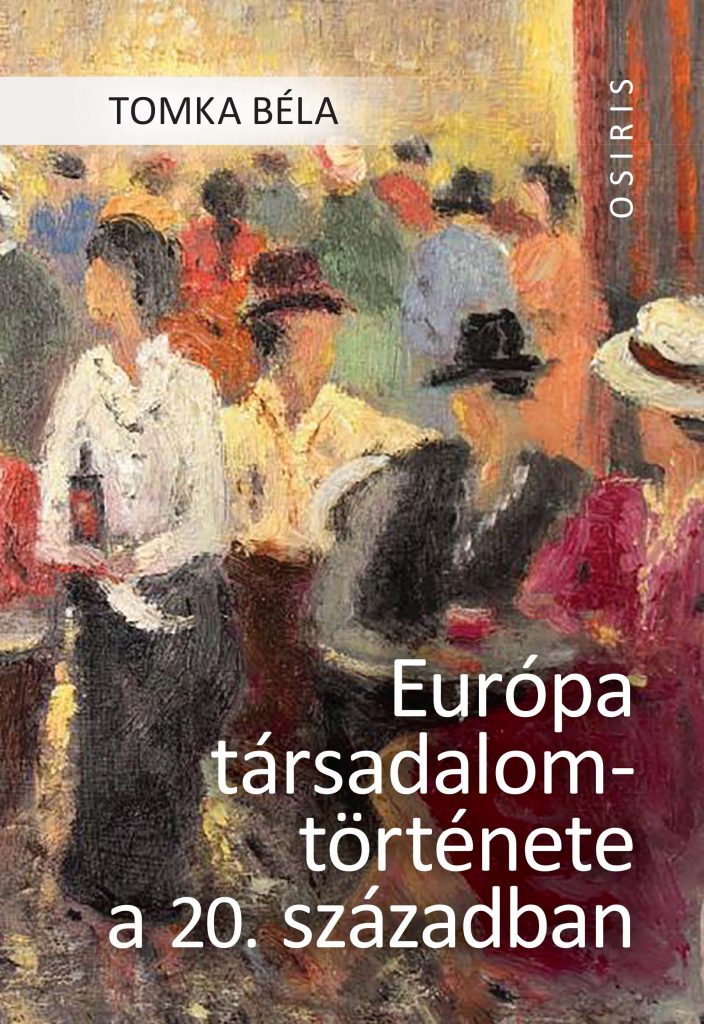
Európa társadalomtörténete a 20. században [A Social History of 20th Century Europe], Fully revised second edition, Budapest: Osiris Kiadó, 2020, 664 pp.
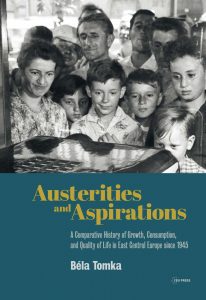
Austerities and Aspirations: A Comparative History of Growth, Consumption and Quality of Life in East Central Europe since 1945, Budapest and New York: Central European University Press, 2020, 445 pp.
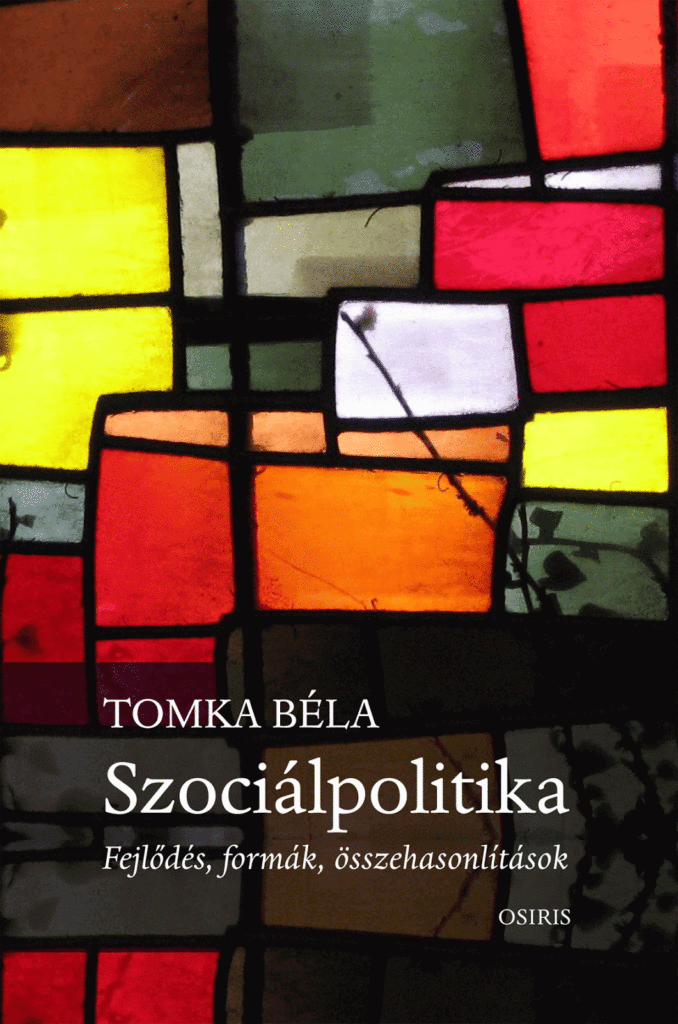
Szociálpolitika: Fejlődés, formák, összehasonlítások [Social Policy: Historical Trends, Forms, and Comparisons], Budapest: Osiris, 2015, 250 pp.
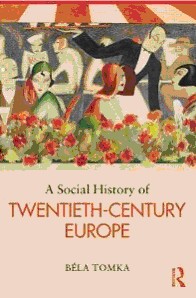
A Social History of Twentieth-Century Europe, London and New York: Routledge, 2013, 552 pp.(***Winner of “Outstanding Academic Title 2013 Award” from CHOICE, American Library Association***)

Gazdasági növekedés, fogyasztás és életminőség: Magyarország nemzetközi összehasonlításban 1918-tól napjainkig [Economic Growth, Consumption and Quality of Life: Hungary in an International Comparison, 1918 to Present], Budapest: Akadémiai Kiadó, 2011, 306 pp.
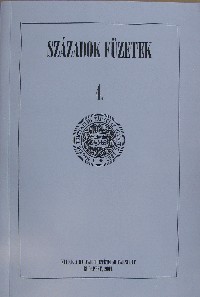
Trendek, típusok, teljesítmények: jóléti államok a 20. században [Trends, Types and Achievements: Welfare States in the 20th Century], Budapest: Magyar Történelmi Társulat – Századok, 2009, 85 pp.
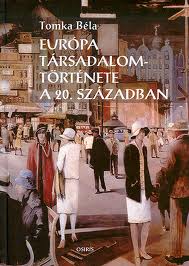
Európa társadalomtörténete a 20. században [A Social History of 20th Century Europe], Budapest: Osiris Kiadó, 2008, 648 pp.
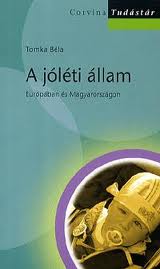
A jóléti állam Európában és Magyarországon [The Welfare State in Europe and Hungary], Budapest: Corvina Kiadó, 2008, 120 pp. Download
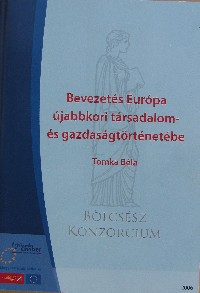
Bevezetés Európa újabb kori társadalom- és gazdaságtörténetébe [Economic and Social History of Modern and Contemporary Europe: An Introduction], Budapest: HEFOP, 2006, 182 pp.
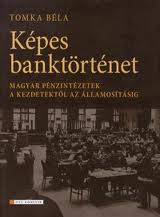
Képes banktörténet. Magyar pénzintézetek a kezdetektől az államosításig [An Illustrated History of Hungarian Banks: From the Beginnings to the Nationalization], Budapest: HVG Kiadó, 2006, 168 pp.

Welfare in East and West: Hungarian Social Security in an International Comparison, 1918–1990, Berlin: Akademie Verlag, 2004, 192 pp. Download
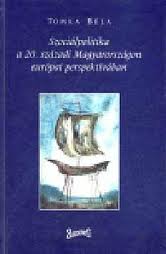
Szociálpolitika a 20. századi Magyarországon európai perspektívában [Social Policy in 20th Century Hungary in a European Perspective], Budapest: Századvég, 2003, 217 pp. Download

Családfejlődés a 20. századi Magyarországon és Nyugat-Európában: konvergencia vagy divergencia? [Family Development in Hungary and Western Europe in the 20th Century: Convergence or Divergence?], Budapest: Osiris, 2000, 152 pp. Download

Érdek és érdektelenség: a bank–ipar viszony a századforduló Magyarországán, 1892–1913 [Interest and Disinterest: Bank–Industry Relations in Hungary at the Turn of the Century, 1892–1913], Debrecen: Debrecen University Press, 1999, 246 pp. Download

A Harmadik Birodalom. A kutatás új útjai [The Third Reich. New Directions of Research], Szeged: Jate Press, 1998, 120 pp. Download
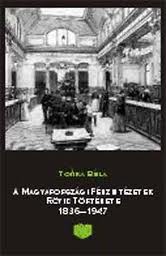
A magyarországi pénzintézetek rövid története, 1836–1947 [A Short History of Hungarian Banking, 1836–1947], Budapest: Gondolat, 1996, 132 pp. (Second edition: Budapest: Aula, 2000, 184 pp.) Download
Edited volumes
(Co-edited by László Szarka) Nationalisms in Action: East Central Europe in the Great War (forthcoming, New York: Berghahn Books, 2021, ca. 380 pp.)
Intézményi és kulturális transzferek a 20. századi Magyarországon [Institutional and Cultural Transfers in 20th-century Hungary], Aetas, vol. 34 (2019), no. 4, 186 pp. Download
Rendszerváltozások Magyarországon és Kelet-Közép-Európában [Regime Changes in Hungary and East Central Europe], Aetas, vol. 28 (2013), no. 4, 218 pp. Download
Rendszerváltozás és történetírás – Korok és korszakolás a történetírásban [Periodization in History], Aetas, vol. 25 (2010), no. 4, 194 pp. Download
(Co-editors: Károly Halmos, Judit Klement and Ágnes Pogány) A felhalmozás míve. Tanulmányok Kövér György tiszteletére [The Art of Accumulation: Studies Honouring György Kövér], Budapest: Századvég Kiadó, 2009, 540 pp.
Magyarország 19–20. századi gazdaság- és társadalomtörténete [Social and Economic History of Hungary in the 19th and 20th Century], Aetas, vol. 19 (2004), no. 1, 190 pp. Download
Összehasonlító történetírás [Comparative History], Aetas, vol. 15 (2000), no. 4, 196 pp. Download
A Habsburg Birodalom a 19. században [The Habsburg Monarchy in the 19th Century], Aetas, vol. 12 (1997), no. 4, 226 pp. Download
Összehasonlító gazdaság- és társadalomtörténet. [Comparative Economic and Social History of Modern Hungary], Aetas, vol. 9 (1994), no. 3, 187 pp. Download
Historiográfia – Körkérdés a magyar történetírás szerkezetéről [Historiography – The Structure of History Writing in Hungary], Aetas, vol. 8 (1993), no. 4, 252 pp. Download
Banktörténet a 19–20. századi Magyarországon [Banking in 19th and 20th Century Hungary], Aetas, vol. 7 (1992), no. 3, 164 pp. Download
Selected articles and contributions to edited volumes
“Lebensstandard und Konsum im 19. und 20. Jahrhundert” (forthcoming in Ulf Brunnbauer, ed., Handbuch zur Geschichte Südosteuropas, Band 6: Wirtschaft und Gesellschaft in Südosteuropa von 1800 bis zur Gegenwart, 2021, ca. 25 pp.)
“Consumption and Leisure in 20th Century Central and Eastern Europe”, in Wlodzimierz Borodziej, Stanislav Holubec and Joachim von Puttkamer, eds., The Routledge History Handbook of Central and Eastern Europe in the Twentieth Century, vol. 1, London and New York: Routledge, 2020, 385–443.
(Co-authored by Stanislav Holubec) “Population and Family in 20th Century Central and Eastern Europe”, in Wlodzimierz Borodziej, Stanislav Holubec and Joachim von Puttkamer, eds., The Routledge History Handbook of Central and Eastern Europe in the Twentieth Century, vol. 1, London and New York: Routledge, 2020, 235–312.
“Fogyasztás a második világháború utáni Kelet-Közép-Európában: politikai meghatározók és transznacionális hatások” [Consumption in Post-war East Central Europe: Political Determinants and Transnational Connections], Aetas, vol. 34 (2019), no. 4, 62–74.
“Az első világháború és a trianoni béke gazdasági hatásai Magyarországon” [The Economic Effects of WWI and the Trianon Treaty in Hungary], in Zsombor Bódy (ed.): Háborúból békébe: a magyar társadalom 1918 után. Konfliktusok, kihívások, változások a háború és az összeomlás nyomán. Budapest: MTA Bölcsészettudományi Kutatóközpont Történettudományi Intézet, 2018, 47–80.
“Erőszak a történelemben: jelentések és hosszú távú trendek” [Violence in History: Meanings and Long-Term Trends], Aetas, vol. 33 (2018), no. 3, 170–185.
“Az EU és a nemzetállamok viszonyáról: Válasz Schöpflin Györgynek” [The EU and the nation states: A Reply to György Schöpflin], Kommentár, vol. 13 (2018), no. 1, 83–88.
“A Horthy-rendszer mérlege vagy vádirata?” [A Balance Sheet or Indictment of the Horthy-regime?], Múltunk, vol. 63 (2018), no. 1, 1–15.
“Társadalmi és politikai változások Európában, 1880–1914 [Social and Political Changes in Europe, 1880–1914], in Gábor Egry and Eszter Kaba, eds., 1916: A fordulat éve?, Budapest: Napvilág Kiadó, 2017, 27–46.
“Mítoszok az Európai Unió demokratikus hiányosságairól” [Myths about the Democratic Deficit of the European Union], Kommentár, vol. 11 (2016), no. 6, 20–28.
“Fordulatok és félfordulatok. Beszámoló a 22. Történész Világkongresszusról” [Whole Turns and Half Turns: The 22nd International Congress of Historical Sciences], Századok, vol. 150 (2016), no. 3, 811–816.
“Körkérdés 1945-ről” [The Significance of 1945 in European History], Levéltári Közlemények, vol. LXXXVI (2015), 337–339.
“A jelenkortörténet kutatása: kinek az eszköze?” [Contemporary History: To Whom Does It Belong?], in Gyöngy Kovács Kiss, ed., A történész műhelye, Cluj: Komp-Press Korunk, 2015, 227–242.
“Az első világháború mint történeti korszakhatár” [The First World War as an Historical Divide], in Béla Tomka, ed., Az első világháború következményei Magyarországon, Budapest: Osiris, 2015, 7–23.
“Demographic change, urbanisation and social movements during the industrial revolutions in Europe”, in Council of Europe, ed., Shared Histories, Strasbourg: Council of Europe, 2014, 57–62.
“Gazdasági rekonstrukció Magyarországon az első világháború után: Régi és új szempontok” [Economic Reconstruction in Hungary after the First World War: Old and New Approaches], in Zsejke Nagy, ed., Gróf Bethlen István és kora, Budapest: Osiris, 2014, 75–95.
“Social History as a Discipline: Development, Themes and Methods” in UNESCO-EOLSS Joint Committee, eds., Historical Developments and Theoretical Approaches in Sociology, Oxford: EOLSS Publishers, 2013, 1–15. Download
“Szociálpolitika Magyarországon a világháborúk korában” [Social Policy in Hungary in the Age of World Wars] Korunk, vol. XXIII (2012), no. 11, 46–55. Download
“Szociálpolitika Magyarországon a Kádár-rendszer időszakában: intézmények, funkciók és szakaszok” [Social Policy in Hungary in the Kádár-Era: Institutions, Functions and Periods] Múltunk, vol. LVII (2012), no. 2, 27–49. Download
“European integration and social policy from an East Central European perspective”, in Arnd Bauerkämper and Hartmut Kaelble, Hrsg., Gesellschaften in der europäischen Integration seit den 1950er Jahren. Migration – Konsum – Sozialpolitik – Repräsentationen, Stuttgart: Franz Steiner Verlag, 2012, 123–132. Download
“Gazdasági változások és a fogyasztás alakulása a huszadik századi Magyarországon” [Economic Changes and Consumption in 20th Century Hungary], in Gyöngy Kovács Kiss and Ignác Romsics, eds., A mi 20. századunk, Cluj–Kolozsvár: Komp-Press Kiadó–Korunk, 2011, 101–179. Download
“A ‘befejezetlen 20. század’ és a ‘csonka 20. század’. A jelenkori európai és magyar történelem periodizációjáról” [The ‘Unfinished 20th Century’ and the ‘Broken 20th Century’: On the Periodization of Contemporary European and Hungarian History], Aetas, vol. 25 (2010), no. 4, 97–106. Download
“Ökumené vagy globális közösség? Beszámoló a 21. Történész Világkongresszusról” [Oecumene or Global Community of Historians?], Századok, vol. 144 (2010), no. 6, 1553–1558. Download
“Életminőség és történelem” [Quality of Life and History], in Zsombor Bódy, Sándor Horváth and Tibor Valuch, eds., Megtalálható-e a múlt? Tanulmányok Gyáni Gábor 60. születésnapjára, Budapest: Argumentum, 2010, 245–255.
“Gazdasági növekedés és fogyasztás Magyarországon a 20. században” [Economic Growth and Consumption in 20th Century Hungary], Korunk, vol. XXI (2010), no. 4, 30–45.
“Social Policy in East Central Europe: Major Trends in the 20th Century” (Co-author: Dorottya Szikra), in Alfio Cerami and Peter Vanhuysee, eds., Post-Communist Welfare Pathways: Theorizing Social Policy Transformations in Central and Eastern Europe, Basingstoke: Palgrave Macmillan, 2009, 17–34. Download
“Social Security in Postwar East Central Europe”, in Alice Kessler-Harris and Maurizio Vaudagna, eds., Democracy and Social Rights in the “Two Wests”. Torino: Otto Editore, 2009, 307–328. Download
“A ‘hatvanas évek’ Magyarországon: összehasonlítások tanulságai” [The ‘Sixties’ in Hungary: Lessons from Comparisons], in Károly Halmos, Judit Klement, Ágnes Pogány and Béla Tomka, eds., Tanulmányok Kövér György hatvanadik születésnapjára, Budapest: Századvég Kiadó, 2009, 552–560. Download
“A jóléti államok az ezredfordulón: válságjelek vagy válságmítoszok?” [The Welfare States at the Turn of the Century: Crises or Crises Myths?], Magyar Tudomány, vol. 170 (2009) no. 2, 197–208. Download
“Az időskor mint elkülönült életszakasz kialakulása: a nyugdíjrendszerek szerepe” [The Old Age as a Differentiated Stage of Life: The Role of Pension Sytems], in Gábor Gyáni and Magdolna Láczay, eds., Generációk a történelemben, Nyíregyháza: Hajnal István Kör, 2008, 39–50. Download
“Intézményesült változékonyság: a jóléti fejlődés sajátos meghatározói Kelet-Közép-Európában” [Institutionalized Volatility: The Peculiar Determinants of Welfare Development in East Central Europe], Korall, vol. 28–29 (2007), 146–166. Download
“Social Solidarity in East Central Europe: Strong Welfare and Weak Labour?” in Bo Strath and Lars Magnusson, eds., European Solidarities: Tensions and Contentions of a Concept, Brussels: Peter Lang, 2007, 171–192. Download
“Perfecting Institutionalization: The Foundation of the International Social History Association”, Journal of Social History, vol. 42 (2007), no. 2, 987–989. Download
“The Politics of Institutionalized Volatility: Lessons from East Central European Welfare Reforms”, in Tomasz Inglot, ed., Fighting Poverty and Reforming Social Security: What Can Post-Soviet States Learn from New Democracies in Central Europe? Washington, DC.: Woodrow Wilson Center, 2007, 67–85. Download
“Rászorultsági elv vagy általános szociális jogok? Jóléti rendszerek történeti és összehasonlító kutatásának tanulságai” [Selectivity or universal social rights? Lessons of comparative welfare state research], Esély, vol. 17 (2006), no. 5, 20–42. Download
“East Central Europe and the European Social Policy Model: A Long-Term View”, East European Quarterly, vol. 40 (2006), no. 2, 135–159. Download
“Social and Economic Convergences in 20th Century Europe”, in Josefina Cuesta Bustillo, ed., Del espacio social europeo a la Europa Social, Salamanca: Univesidad de Salamanca, 2005.
“Globalizáció és fragmentáció között. Beszámoló a Történész Világkongresszusról” [Between Globalization and Fragmentation. On the 20th International Congress of Historical Sciences in Sydney], Századok, vol. 139 (2005), no. 6, 1558–1563. Download
“A társadalomtörténet-írás nemzetközi intézményesülésének állomásai. A Nemzetközi Társadalomtörténeti Társaság létrejöttéről” [The Institutionalization of International Social History. The Foundation of the International Social History Association], Századok, vol. 139 (2005), no. 6, 1563–1566. Download
“Determinants of East Central European Welfare Systems”, in Martyn Lyons, ed., History in Global Perspective: Proceedings of the 20th International Congress of Historical Sciences , Sydney: University of New South Wales, 2005.
“Az összehasonlító módszer a történetírásban – eredmények és kihasználatlan lehetőségek” [The Comparative Method in the Historical Sciences: Results and Unexploited Possibilities], Aetas, vol. 20. (2005), no. 1–2, 243–258.
“Az Európai Szociális Modell múltja és jelene – kelet-közép-európai perspektívák” [The Past and Present of the European Social Model: East Central European Perspectives], Esély, vol. 15 (2004), no. 5, 32–53. Download
“Wohlfahrtsstaatliche Entwicklung in Ostmitteleuropa und das europäische Sozialmodell 1945–1990”, in Hartmut Kaelble und Günter Schmid (Hrsg.), Das Europäische Sozialmodell: Auf dem Weg zum transnationalen Sozialstaat (Wissenschaftszentrum zu Berlin, Jahrbuch 2004), Berlin: Sigma Verlag, 2004, 107–139. Download
“Az összehasonlító történetírásról. Tanulságok a magyar történetírás számára” [On Comparative History: Lessons for the History Writing in Hungary], Magyar Tudomány, vol. IL (2004), no. 7, 732–742. Download
“Társadalomtörténeti hagyományok, irányzatok, módszerek – a nemzetközi gyakorlat szemszögéből” [Traditions, Approaches and Methods in Social History: Some Lessons from the International Research], Korall, vol. 15 (2004), 341–348.
“Western European Welfare States in the 20th Century: Convergences and Divergences in a Long-Run Perspective”, International Journal of Social Welfare, vol. 12 (2003), no. 4, 249–260. Download
“A jóléti kiadások alakulása Magyarországon nemzetközi összehasonlításban, 1918–1990” [Welfare expenditures in Hungary in international comparison, 1918–1990], Statisztikai Szemle, vol. 81 (2003), no. 1, 52–69. Download
“Demographic Diversity and Convergence in Europe, 1918–1990: The Hungarian Case”, Demographic Research, vol. 6 (2002), no. 2, 19–48. Download
“Social security in Hungary in a long-run and comparative perspective: expenditures, social rights, and organization, 1918–1990”, Arbeitspapiere des Osteuropa-Instituts der Freien Universitaet Berlin. Arbeitsbereich Politik und Gesellschaft. Nr. 43, 2002, 45 pp. Download
“A jóléti intézmények fejlődésének meghatározói a XX. századi Európában. A hosszú távú összehasonlítások néhány tanulsága” [Determinants of welfare development in 20th century Europe: some lessons of long-run comparisons], Valóság, vol. 45 (2002), no. 6, 83–94.
“A jóléti rendszerek a 20. századi Magyarországon: Nemzetközi összehasonlítás” [The welfare systems in 20th century Hungary: An international comparison], Történelmi Szemle, vol. 43 (2001), no. 3–4, 209–236. Download
“Social Integration in 20th Century Europe: Evidences from Hungarian Family Development”, Journal of Social History, vol. 35 (2001), no. 2, 327–348. Download
“The Development of Hungarian Banking: An International Comparison, 1880–1931”, Journal of European Economic History, vol. 30 (2001), no. 1, 125–162. Download
“A német tőke Magyarországon az első világháború előtti évtizedekben” [German capital investment in Hungary before WWI], Századok, vol. 135 (2001), 1053–1073. Download
“Financial Institutions in Hungary in Central-European Comparison, 1873–1931”, Nordic Notes (Special Edition: Oslo 2000), vol. 5 (2001), 1–33.
“Interlocking Directorates Between Banks and Industrial Companies in Hungary at the Beginning of the Twentieth Century”, Business History, vol. 43 (2001), no. 1, 25–42. Download
“Társadalmi integráció a 20. századi Európában: Magyarország esete” [Social Integration in Europe in the 20th Century: The Case of Hungary], Századvég, vol. 17 (2000), 3–40.
“A magyar bankrendszer fejlődésének sajátosságai nemzetközi összehasonlításban, 1880–1931” [The Development of the Hungarian Banking Structure in a Comparative Perspective, 1880–1931] Századok, vol. 133 (1999), no. 3, 655–683. Download
“Das Verhältnis zwischen Banken und Industrie in Ungarn, 1895–1913” Ungarn–Jahrbuch (München), vol. 23 (1997), 173–203. Download
“Személyi összefonódás bankok és iparvállalatok között a századforduló Magyarországán” [Interlocking Directorates in Hungary at the Turn of the Century] Replika, vol. 25 (1997), no. 1, 37–46. Download
“Bankuralom, bankérdekeltség, bankellenőrzés: A magyarországi pénzintézetek ipari kapcsolatai a századfordulón, 1895–1913” [Bank Hegemony, Bank Interests and Bank Control: Industrial Relations of Banks in Hungary, 1895–1913] Történelmi Szemle, vol. XXXVII (1995), no. 2, 171–207. Download
“A totalitarizmuselméletektől az »Új társadalomtörténet«-ig. Változó hangsúlyok a Harmadik Birodalom értelmezésében” [From the Totalitarianism-Theories to the »New Social History«: Changing Interpretations of the Third Reich] Aetas, vol. 7 (1993), no. 4, 92–112.
“A Hitler-jelenség és a Harmadik Birodalom uralmi rendszere” [Hitler and the Power Structure of the Third Reich] Századok, vol. 127 (1993), no. 2, 312–331. Download
“A bank–ipar kapcsolat Németországban 1850 és 1913 között” [Bank–Industry Relations in Germany between 1850 and 1913] Századok, vol. 127 (1993), no. 1, 127–142. Download
“Történészviták a Harmadik Birodalom gazdaságáról” [Debates on the Economy of the Third Reich] Világtörténet, vol. 14 (1992), no. 1–2, 33–43.
“Vita a weimari köztársaság bukásának gazdasági okairól” [Debates on the Economy of Nazi Germany] Világtörténet, vol. 9 (1987), no. 4, 110–130. Download
Work in progress
The Manuscript of a book (ca. 200 pages) with the working title “Comparative, Transnational and Global History”
For a full list of publications, see Hungarian Bibliography of Scholarly Works (MTMT)
Jelenlegi kutatások
Tomka Béla fő kutatási területét a 20. századi magyar és európai gazdaság- és társadalomtörténet jelenti. Ezen belül a család és a népesség, a szociálpolitika, a fogyasztás történetéről publikált átfogó munkákat. Legutóbb a gazdasági növekedés, a fogyasztás és az életminőség kelet-közép-európai összehasonlító történeti vizsgálatával foglalkozott. E témakörökben a következő munkái jelentek meg illetve állnak megjelenés alatt:
- Austerities and Aspirations: A Comparative History of Growth, Consumption and Quality of Life in East Central Europe since 1945, Budapest and New York: Central European University Press, 2020, 445 pp.
- “Consumption and Leisure in 20th Century Central and Eastern Europe”, in Wlodzimierz Borodziej, Stanislav Holubec and Joachim von Puttkamer, eds., The Routledge History Handbook of Central and Eastern Europe in the Twentieth Century, vol. 1, London and New York: Routledge, 2020, 385–443.
- (Co-authored by Stanislav Holubec) “Population and Family in 20th Century Central and Eastern Europe”, in Wlodzimierz Borodziej, Stanislav Holubec and Joachim von Puttkamer, eds., The Routledge History Handbook of Central and Eastern Europe in the Twentieth Century, vol. 1, London and New York: Routledge, 2020, 235–312.
- “Lebensstandard und Konsum im 19. und 20. Jahrhundert” (forthcoming in Ulf Brunnbauer, Hrsg., Handbuch zur Geschichte Südosteuropas, Band 6: Wirtschaft und Gesellschaft in Südosteuropa von 1800 bis zur Gegenwart, 2021, ca. 25 pp.)
- “Fogyasztás a második világháború utáni Kelet-Közép-Európában: politikai meghatározók és transznacionális hatások”, Aetas, vol. 34 (2019), no. 4, 62–74.
- Intézményi és kulturális transzferek a 20. századi Magyarországon. Thematic issue of the journal Aetas, vol. 34 (2019), no. 4, 186 pp.
Érdeklődési körébe tartozik továbbá az erőszak, a propaganda és az ellenségképek története, valamint az európai integráció és a globalizáció folyamata. Erre vonatkozó legutóbb megjelent, illetve megjelenés alatt álló tanulmányai:
- (Co-edited by László Szarka) Nationalisms in Action: East Central Europe in the Great War (forthcoming, New York: Berghahn Books, 2021, ca. 380 pp.)
- “Erőszak a történelemben: jelentések és hosszú távú trendek”, Aetas, vol. 33 (2018), no. 3, 170–185.
- “Mítoszok az Európai Unió demokratikus hiányosságairól”, Kommentár, vol. 11 (2016), no. 6, 20–28.
Margittai Lindával szerkeszti a Történelem és erőszak című kötetet, mely a Hajnal István Kör 2019. augusztusi, hasonló című konferenciájának anyagát gyűjti egybe.


